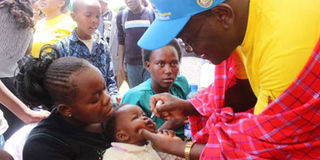We must keep up child immunisation

Health Cabinet Secretary Cleopa Mailu administers polio vaccination to a child in Kajiado County during the launch of the nationwide campaign in April 2016. There can be no better illustration of the importance of vaccination than the story of smallpox that is estimated to have killed 300 million people in the 20th century alone. PHOTO | NATION MEDIA GROUP
What you need to know:
- Despite the economic benefits of vaccination, fewer than 20 countries in Africa currently fund more than 50 per cent of their own immunisation expenditure.
- Vaccination plays a role in preventing at least 25 diseases that include polio, hepatitis B, whooping cough, measles, diphtheria, measles, tetanus, diarrhoea, pneumonia, and cervical cancers.
- The fact is that the vaccine-preventable diseases will return if we stop vaccination programmes.
I had hoped that the country would come to a standstill over the recent announcement that donors planned to reduce funding for child immunisation programmes by next year.
It was reported that the Global Alliance for Vaccines and Immunisation pays 90 per cent of our bill, with the government shouldering the remaining 10 per cent.
If you are conversant with health care financing strategies, you will probably know that this situation is not unique to Kenya.
Despite the economic benefits of vaccination, fewer than 20 countries in Africa currently fund more than 50 per cent of their own immunisation expenditure.
Before I get to specifics about the likely consequences of a funding gap, a word about how we got here in the first place.
You will recall that in 2014, the Kenya National Bureau of Statistics, the World Bank, and the International Monetary Fund rebased the country’s gross domestic product, propelling Kenya into a middle-income country 16 years ahead of time.
I spoke to an economist who informed me that the review was informed by re-alignment of economic indicators to capture new sectors of our economy such as information and communication technology, financial services, and telecommunications that had not been captured before.
One consequence of the rebasing that made us the ninth “richest” country in Africa was that we could no longer access low-interest concessionary loans from international finance and development institutions.
It also meant that we were no longer eligible for free vaccines from the alliance.
Now, immunisation is one of the simplest, cheapest, and most cost-effective medical interventions and it is estimated to prevent 2.5 million deaths every year worldwide.
If you think the Ebola outbreak that hit west African countries was the worst of human tragedies, you are mistaken.
There can be no better illustration of the importance of vaccination than the story of smallpox that is estimated to have killed 300 million people in the 20th century alone.
BENEFITS OF VACCINATION
In 1980, the World Health Organisation finally declared this human scourge eradicated after an extensive programme of immunisation.
Vaccination plays a role in preventing at least 25 diseases that include polio, hepatitis B, whooping cough, measles, diphtheria, measles, tetanus, diarrhoea, pneumonia, and cervical cancers.
Let me focus on vaccines for diarrhoea and pneumonia, two of the leading killers of children, that the government, with donor support, introduced into the National Immunisation Programme about two years ago.
These two conditions remain the leading causes of death in children younger than five years and together, caused an estimated two million deaths in 2011 worldwide.
According to a 2013 landmark Lancet publication on Global Burden of Childhood Diarrhoea and Pneumonia, at least one-third of severe episodes of pneumonia and two-thirds of deaths from the disease are caused by vaccine-preventable pneumonias.
The same report indicated that nearly one-third of the episodes of severe diarrhoea are preventable by vaccination (for example, against rotavirus and cholera).
From my recollection when I worked in the paediatric wards at Kenyatta National Hospital, a typical child infected with rotavirus could experience up to 20 bowel movements in a day.
These children were also twice as likely to be dehydrated as those who were not rotavirus-infected.
Anorexia, abdominal cramping, irritability, and lethargy may also be part of the clinical picture.
Without access to oral rehydration therapy and critical care, death is often a common consequence for a child with severe gastroenteritis (diarrhoea and vomiting) caused by the rotavirus.
LET'S ACT NOW
By now, you are probably wondering why, despite the benefits, we still rely on donors to fund our immunisation programme.
I can only think about two possible reasons: poor priority setting and greed.
I am reminded that in Kenya, a member of Parliament earns $212,904 per year compared to a law maker in the United States and United Kingdom, who earn $180,960 and $104,232, respectively.
We definitely need a national debate on allocation of government spending to health priorities.
The fact is that the vaccine-preventable diseases will return if we stop vaccination programmes.
Dr Obwogo is a senior quality improvement adviser in health policy and systems strengthening. He works for an international NGO. [email protected]





